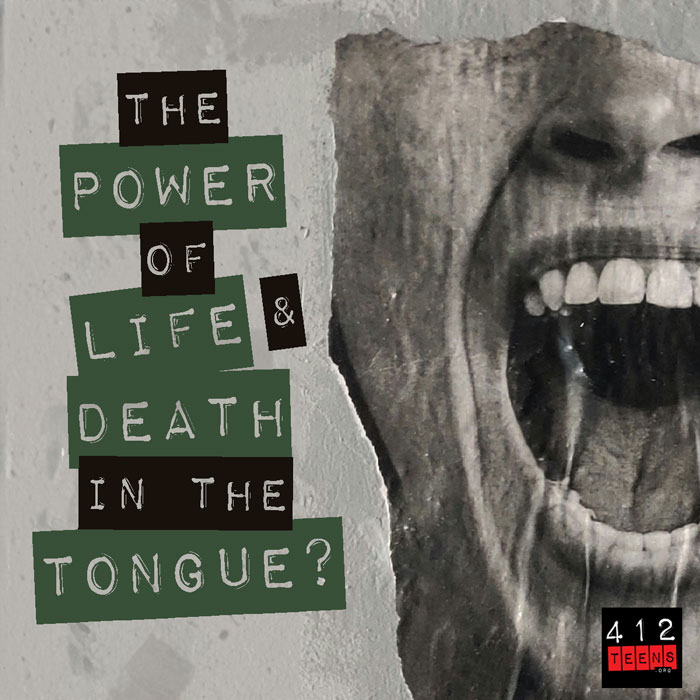What does it mean that death and life are in the power of the tongue (Proverbs 18:21)?

The tongue is an organ we generally associate with eating, drinking, and speaking. It's this last bit that the Bible speaks of the most—the power of speech. The human tongue has a great capacity for good or evil that far exceeds its routine uses. Proverbs 18:21 refers to the tongue's incredible potential: "Death and life are in the power of the tongue, and those who love it will eat its fruits."
To understand this proverb, we need to understand that the Bible often uses the word "tongue" as a stand-in word for a person's speech. For example, a "gentle tongue" is speech that encourages others (Proverbs 15:4), and a "lying tongue" is speech that deceives them (Proverbs 12:19).
A Matter of Life & Death
When Proverbs 18:21 says "death and life" are in the power of the tongue, it's referring to the incredible impact words can have on other people—figuratively (and sometimes literally) a matter of life and death. A heart that God has regenerated will speak life-giving words such as encouragement, thankfulness, and graciousness (Proverbs 10:11; Ezekiel 36:26). A heart that God hasn't regenerated will speak lifeless and destructive words such as slander, crude joking, and obscenities (Ephesians 4:29, 5:4; Colossians 3:8).
The phrase "the power of the tongue" is an interesting wordplay because the physical tongue is delicate, sensitive, and not physically strong. James explains that the tongue, while small and weak, has a greater capacity for good or evil than its size suggests (James 3:5, 9-10). Our words can achieve good and wonderful things and also condemn us to darkness (Matthew 12:37).
A "death-giving" tongue is compared to a razor blade (Psalm 52:2), the thrust of a sword (Proverbs 12:18), and the bite of a serpent (Psalm 140:3). Words can blaspheme God (Matthew 12:31), destroy relationships (Proverbs 16:28), and overthrow communities (Proverbs 11:11).
A "life-giving" tongue is righteous speech, as valuable as precious silver (Proverbs 10:20), like golden apples (Proverbs 25:11), and sweet as a honeycomb (Proverbs 16:24). Words can enrich life through inspiring hope, strengthening faith, and spreading joy (Ephesians 4:29; Psalm 19:14).
Our Words Reflect Our Hearts
The Bible teaches that it's not the tongue itself that is the root of good or evil speech. Rather, how a person chooses to USE their tongue (i.e. words, speech) indicates the state of their heart. Proverbs 16:23 says that "the heart of the wise makes his speech judicious and adds persuasiveness to his lips." On the other hand, Proverbs 15:28 says that "the mouth of the wicked pours out evil things."
During Jesus' ministry, He compared the words of the Pharisees to the fruit of a tree, pointing out that the health of a tree is directly related to the condition of its fruit (Matthew 12:33). Jesus challenged these religious leaders: "How can you speak good, when you are evil? For out of the abundance of the heart the mouth speaks" (Matthew 12:34). Their hearts were evil, and therefore their words were like rotted fruit from a diseased tree. Just as the condition of fruit reflects the condition of the tree, a person's words reflect the condition of their heart (Matthew 12:35; James 3:11-12).
We should never underestimate the considerable effect our words have on others. You may have experienced a careless word from a friend or family member that pierced your heart and caused lasting pain. Or maybe you've had a teacher who encouraged you and those words have been a light to you for years. Words matter. What we say means something and holds immense power. We ought to always strive to be wise in how we use such a mighty instrument (Colossians 4:6; Matthew 12:36).
ALSO SEE:
- What does the Bible say about gossip?
- How To Stop the Gossip
- How can I help new believers?
- What does the Bible say about dealing with mean people?
- How should I respond to a bully?
- How do I stand up for myself in a godly way?
- How should Christians respond to internet trolls?
- How should I deal with negative people?
- Should I tell on someone when I see them doing something bad?
- What is kindness as a Fruit of the Spirit?
- Is saying OMG still considered cussing?
- How can I evangelize my friends and family without pushing them away?
- Why should I talk about my faith at school?
- What does it mean to heap burning coals on your enemy's head?


TL;DR
The Bible teaches that it is not the tongue itself that is the root of good or evil speech. Rather, how a person chooses to USE their tongue (i.e. words, speech) indicates the state of their heart. We should never underestimate the considerable effect our words have on others. You may have experienced a careless word from a friend or family member that pierced your heart and caused lasting pain. Or maybe you've had a teacher who encouraged you and those words have been a light to you for years. Words matter. What we say means something and holds immense power. We ought to always strive to be wise in how we use such a mighty instrument (Colossians 4:6; Matthew 12:36).

Writer & Managing Editor: Catiana (Cat)
Cat is the web producer and managing editor of 412teens.org. She is known as "412teens" on the 412teens Discord. She loves audiobooks, feeding the people she cares about, and using Christmas lights to illuminate a room. When Cat is not cooking, gardening, or practicing creativity, she enjoys spending time with her two adult kids, six socially-awkward cats, and her amazing friend-amily.
